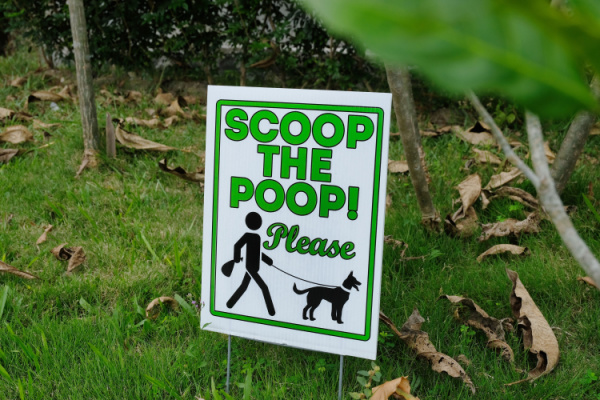What goes in must come out. That’s why the first week in April is International Pooper Scooper Week, a week that recognizes a year-round problem and offers solutions to it. This awareness week was introduced in 2008 by the Association of Professional Animal Waste Specialists (aPaws) with the hope of educating pet owners on the importance of cleaning up after their dogs.
aPaws estimates that pet pooches produce over 4.4 billion pounds of waste per year. That staggering amount could cover 900 football fields with 12 inches of dog waste! Yuch! Each year, the annual convention of pooper scoopers includes a race called “a turd-herding contest.”
And for much of the country, spring reveals the droppings our canine friends have left behind. While many dog owners clean up after every time their pooch does its business, sometimes deep snow or extreme temperatures prevent this kind of dedication. So, they spend an hour or so raking up the winter’s evidence and prepping their yard for spring. Or, they hire a professional to do it for them. Yes, professional poop scooping businesses are taking off around the country! Consider that more than 48 million households have a dog, that’s a lot of business going on.
According to the Environmental Protection Agency (EPA), animal waste is one of the many seemingly small sources of pollution that can add up to big problems for water quality, and even human health. When dog waste is left behind, not only is it unsightly and leaves an overwhelming smell, but it can also leave excessive amounts of bacteria, parasites and nitrates that disrupt outdoor ecosystems. The best way to make sure that our park habitats and natural wildlife stay healthy is by encouraging all pet owners to pick up after their dogs and properly dispose of the waste, ideally in biodegradable bag, and then in a trash can or at a designated pet waste station.
4 Reasons Why it’s Important to Pick Up your Dog Waste:
- Dog poop is not natural. It is rational to think that poop is natural because we often see wildlife droppings outside. Wild animals eat nutrients from their existing ecosystem, so they are simply returning what is already there. Dogs, on the other hand, eat pet foods specifically designed to ensure a healthy diet. These pet foods can cause their poop to contain excessive amounts of bacteria and nitrates that can upset the delicate balance of an existing outdoor ecosystem.
- Dog poop does not decompose. Dog waste will not fully break down on its own. It is logical to think that dog waste is compostable, but before dog feces fully decomposes, it will get washed over by rainwater, causing it to get into land and water systems where it releases harmful nutrients that cause excessive growth of algae in lakes, streams and rivers. This type of pollution negatively impacts wildlife and humans.
- Dog poop contains disease causing bacteria and parasites. Dog waste contains bacteria and parasites that can contaminate water and soil and also be harmful to humans. Even if your dog does not show symptoms of being sick, their waste can carry diseases that are harmful to other animals and humans. Salmonella, E.coli and roundworms are a few of the diseases that can be found in dog poop.
- It’s your “doody” to pick up after your dog. Let’s face it, picking up after your dog is not only common courtesy, but it is your responsibility. When you plan to be out and about with your dog, be prepared to clean up after them. Bring a bag with you. While you can reuse plastic grocery bags, a more environmentally friendly option is a biodegradable bag made specifically for the job and available at many pet retailers. Also, avoid letting your dog poop within 200 feet of a body of water and do not throw dog poop into a storm drain.
Picking up your dog’s poop may not be your favorite chore, but it’s an important one that helps keep our parks and outdoor spaces, along with our community and pets safe. So, let’s get to poop scoopin’!
—
Photo Credit: sweeann / Shutterstock.com
